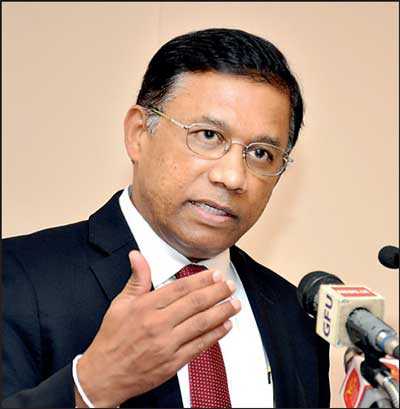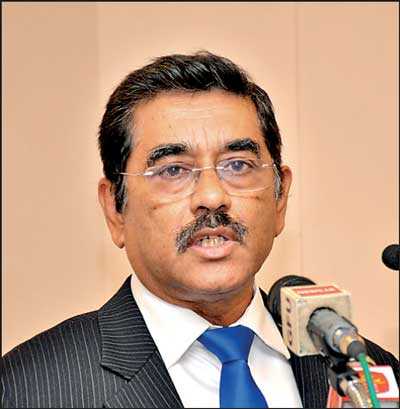Sunday Feb 15, 2026
Sunday Feb 15, 2026
Wednesday, 5 December 2018 00:00 - - {{hitsCtrl.values.hits}}
By Uditha Jayasinghe
Solutions for Sri Lanka’s sluggish growth and currency depreciation challenges need sustainable policy making that underpin structural economic changes over the medium to long term, believes a top economist.
National Economic Council (NEC) Secretary General Prof. Lalith Samarakoon speaking at an event titled ‘Sri Lanka’s Economic Challenges in the year 2019’ outlined the international and local challenges that will need to be navigated to improve growth next year. He pointed out that the trade war between the US and China, Brexit and linked protectionist policies were dampening growth.
 |
National Economic Council (NEC) Secretary General Prof. Lalith Samarakoon |
 |
Central Bank Senior Deputy Governor Dr. Nandalal Weerasinghe |
Prof. Samarakoon pointed out the International Monetary Fund (IMF) has said the global economy is now expected to grow at 3.7% this year and next year — down 0.2% points from an earlier forecast, according to the fund’s latest World Economic Outlook.
The fund also cut its forecasts for global trade volume: The total good and services flow is expected to grow by 4.2% this year and 4% next year — down 0.6 and 0.5% points, respectively, from earlier estimates.
And the two economies in the centre of the ongoing tariff fight — the US and China — are also expected to grow slower than initially projected. The IMF maintained that the US and China will grow by 2.9% and 6.6%, respectively, this year but said both would slow more than expected to 2.5% and 6.2%, respectively, in 2019.
Sri Lanka’s growth rate has been correspondingly slow with the Central Bank estimating growth to end the year at 3.8%. However, prognosis for 2019 have been better given the heavy rains, which could boost agriculture and related industries fuelling expectations of a 4% or above growth for next year, he added.
“We are not growing at a rate we would desire. There are definitely things that we want to improve and we should improve over time, among these are the current account deficit and the budget deficit. We have what is known as twin deficits, these combined with low growth do not augur well for our currency. Therefore structurally speaking we have fundamental issue we have to solve in the medium to long term,” he said.
Given the slow rate of growth Sri Lanka would have to look at increasing its exports as well as how to better link with global value chains. Prof. Samarakoon pointed out that despite the lapse of decades Sri Lanka has not diversified its exports or its export markets, leading to a situation where its foreign earnings are low and uncertain. Improving the investment climate was also an imperative as more countries compete for a limited amount of investment.
He also noted that rising interest rates in the US along with the appreciation of the dollar was resulting outflows from Sri Lanka’s securities and stock markets. Emerging economies as a whole have experienced larger volumes of capital outflows as investors shift their money out on the back of rising interest rates in the US.
Countries such as Argentina and Turkey have been among the most troubled, with their currencies crashing to all-time lows against the greenback amid questions over their governments’ economic management. The US Federal Reserve has announced it will raise interest rates three times in 2019, potentially increasing outflows.
“If you think of the rupee deprecation the countries where the currency value has dropped the most are the ones having current account and budget deficits and slow growth. These structural problems are not something new, I’m not the first person to point these things out. However, you cannot change this situation in a short time period. We need to have economic policies that are growth oriented, export oriented and investment oriented. These have to provide the proper incentives to achieve growth. Ultimately Sri Lanka will have to grow at a much higher growth rate than the 4% we have seen in order to overcome the structural problems, as well as to have sustained debt servicing in the future,” he said.
Central Bank Deputy Governor Dr. Nandalal Weerasinghe supported the views of Prof. Samarakoon and called for support for the fiscal consolidation efforts made by Sri Lanka. He also pointed out that the Central Bank was dedicated to a progressive and data driven monetary policy that took into account inflation targeting to keep the economy at a balanced level.
“The only way to stop the rupee from depreciating is to spend reserves but we cannot do that as we also have significant debt repayments next year. We have to preserve our reserves for those responsibilities. The rupee depreciation is nothing new. Trade deficits are nothing new. We have been seeing both for decades. In fact when I’m asked why the rupee is depreciating I point out that has been the case since 1977 when we opened up our economy. So how is this news?”
He also advocated medium to long term economic changes that would support industries and services to export, attract investment and allow Sri Lanka to make use of its strategic and human resources.
Pix by Lasantha Kumara